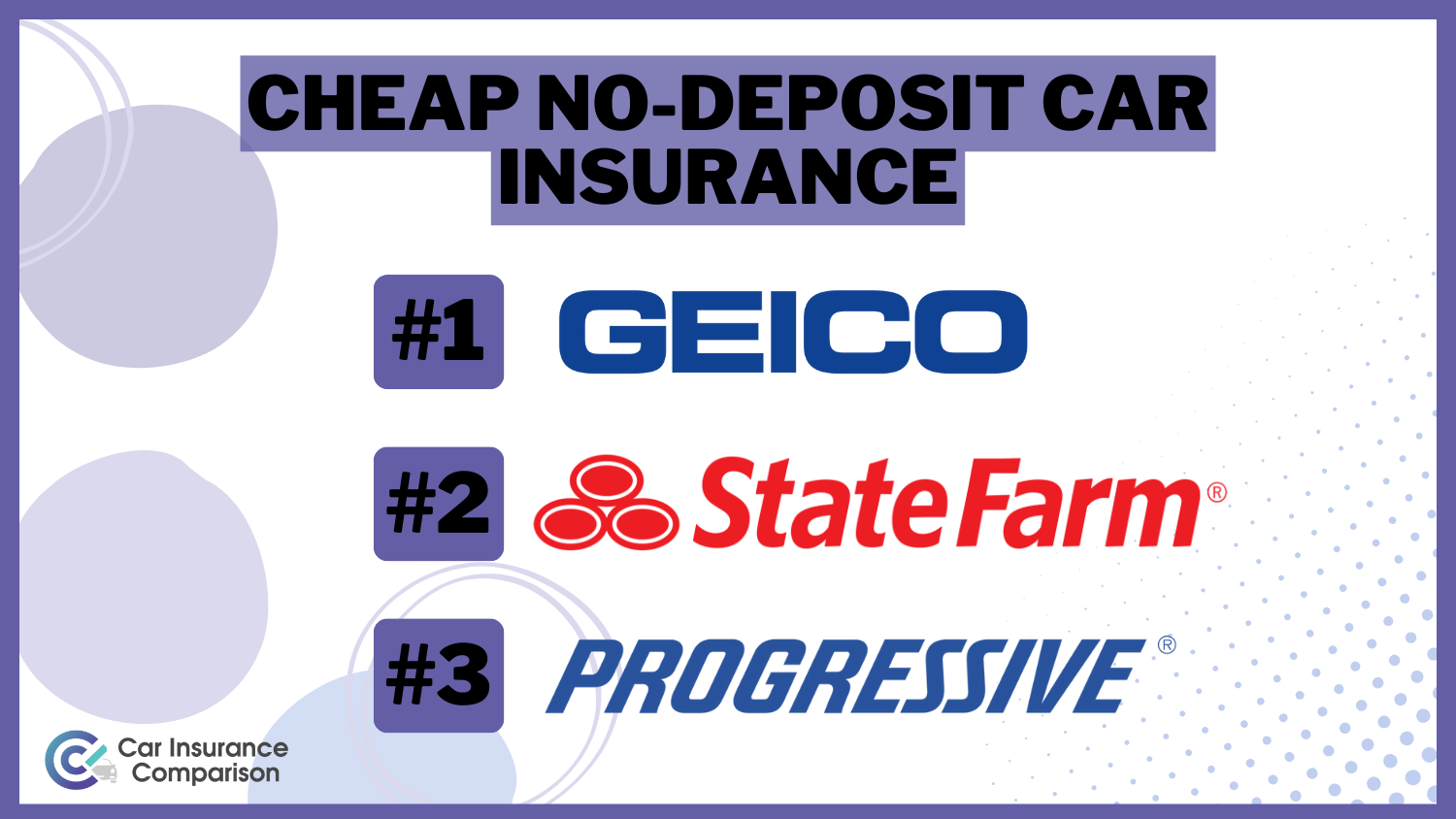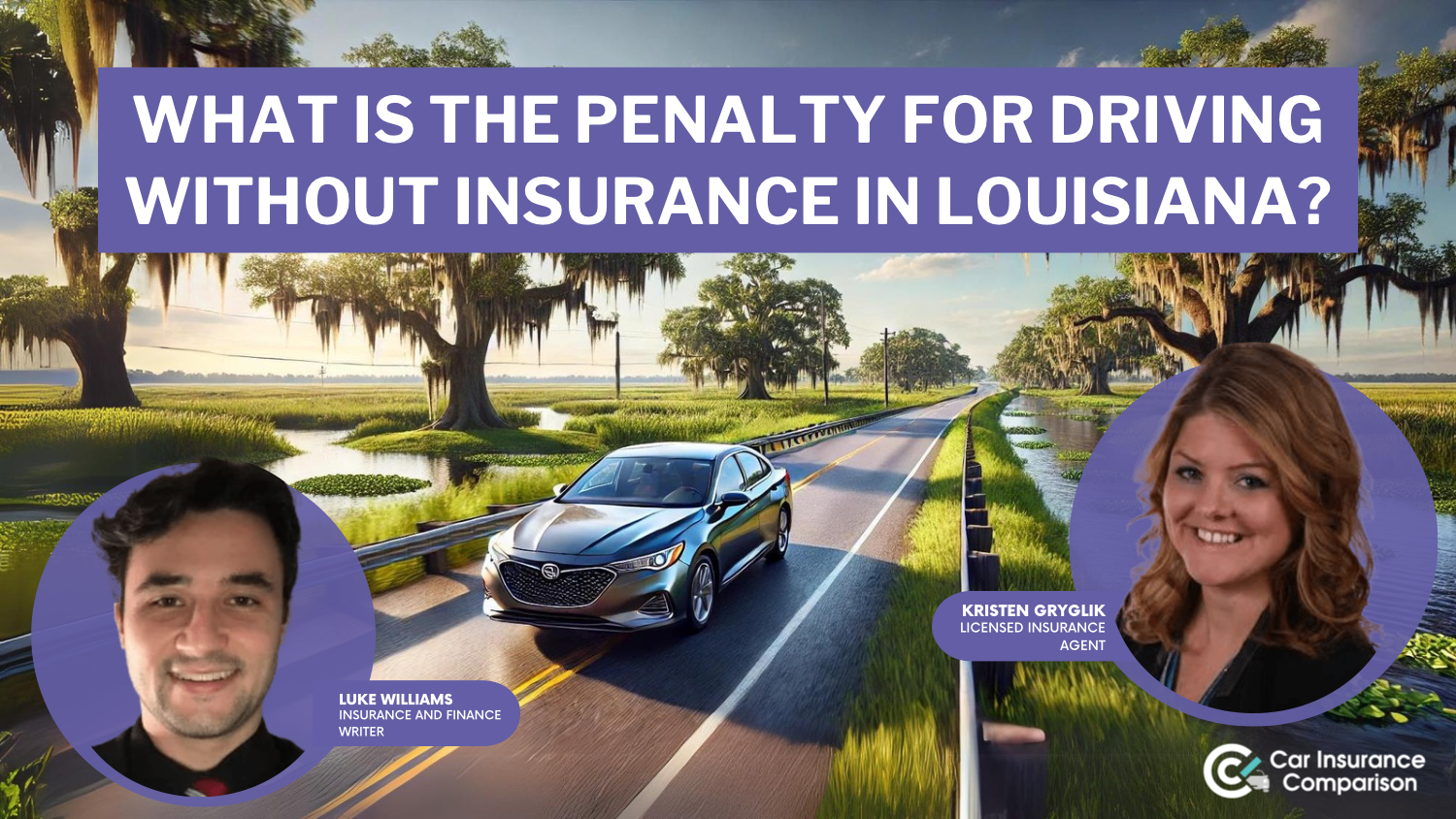How much does a pacemaker affect car insurance rates?
A pacemaker does not affect car insurance. Car insurance companies take your age into account when determining your car insurance rates, but your health is not a factor. If you are in a car accident caused by a malfunctioning pacemaker, then your pacemaker will affect car insurance costs. Start comparing car insurance quotes online below to see how much a policy add-on will be.
Read more Secured with SHA-256 Encryption





Table of Contents
Table of Contents


Insurance Claims Support & Sr. Adjuster
Kalyn grew up in an insurance family with a grandfather, aunt, and uncle leading successful careers as insurance agents. She soon found she has similar interests and followed in their footsteps. After spending about ten years working in the insurance industry as both an appraiser dispatcher and a senior property claims adjuster, she decided to combine her years of insurance experience with another...
Kalyn Johnson


Licensed Insurance Agent & Agency Owner
Tracey L. Wells is a licensed insurance agent and Farmers insurance agency owner with 23 years of experience. He is proud to be a local Farmers agent serving Grayson, Georgia and surrounding areas. With experience as both an underwriter and agent, he provides his customers with insight that others agents may not have. His agency offers all lines of insurance including home, life, auto, RV, busi...
Tracey L. Wells
Updated September 2024
Health issues are unfortunately something that all of us are going to have to deal with at some point in our life.One very common thing that many people benefit from is that of a pacemaker. A pacemaker is a tiny device that assists our heart to keep it at a steady beat. When you are shopping for auto insurance, though, does having a pacemaker impact anything? Will a pacemaker play a role in your ability to purchase auto insurance, and if not, will it at least have a bearing on the price point that you pay?Car insurance providers have it down to a near science regarding what certain risks presented to them will pay in exchange for coverage, limits, and for their policy overall.
The factors that they consider though are usually exclusive of the state of your health overall when purchasing a car insurance policy.
Simply put, a pacemaker itself is not going to impact your auto insurance rates and the overall premium directly, but it can play a role. Let us dive into this in a bit more detail.If you are concerned about your health’s effect on your auto insurance rates and want more affordable coverage, enter your ZIP code above and compare at least three to four other policies today!
- Auto insurance carriers may consider your age, but not too much focus is on your health
- Having a pacemaker should not directly impact the premium you pay for car insurance
- As with any new customer, you want to shop the insurance market if you have a pacemaker to find the best value
The State of Your Health
The state of your health typically does not have an impact on its own regarding what you are going to pay for health insurance.If you are someone that is obese, someone that has a pacemaker, or maybe suffers from a different type of health issue, that is not going to be explored while you are shopping for auto insurance.Car insurance carriers are typically going to collect the information on your vehicle, the driving habits that you have, as well as your state-issued drivers’ license. The drivers’ license will reveal to them all of the personal information that they are going to utilize in pricing out your policy overall.What the drivers’ license does not have will be all of your health information.If you are legally blind or have some driving restriction that is a part of your license, sure that will play a factor. The results of your motor vehicle record with the state, though, will not say whether or not you have a pacemaker.
Free Insurance Comparison
Compare Quotes From Top Companies and Save
Secured with SHA-256 Encryption
Driving and Activity Considerations with a Pacemaker
After pacemaker surgery, there are important considerations regarding driving and activities to ensure safety and optimal health management. Driving restrictions may vary depending on individual recovery and medical advice. Typically, patients are advised to avoid driving for a short period immediately after pacemaker implantation to allow for healing and adjustment to the device. Medical professionals often provide specific guidance based on factors like the type of pacemaker, underlying heart condition, and individual response to surgery.
Activities restricted with a pacemaker are generally related to vigorous physical exertion or exposure to strong magnetic fields, which could potentially interfere with the pacemaker’s function. While most daily activities are unaffected, patients are usually advised to avoid contact sports or activities that involve significant impact to the chest area. Jobs restricted with a pacemaker may include occupations that expose individuals to electromagnetic fields or require heavy lifting, depending on the specific advice from healthcare providers.
Regarding driving considerations after pacemaker implantation, it’s crucial for patients to follow medical advice regarding when it is safe to resume driving. This often depends on factors such as the patient’s overall health, any driving restrictions imposed by medical professionals, and compliance with local driving regulations. Understanding these considerations ensures that individuals can safely manage their daily routines while benefiting from the enhanced quality of life expectancy with a complete heart block and pacemaker.
For those traveling, including passing through airport security, carrying documentation about the pacemaker is advisable to expedite security checks and ensure understanding by airport personnel. Life expectancy with atrial fibrillation, especially when managed with a pacemaker, can vary depending on individual health factors and the effectiveness of treatment. Prospective patients may wish to consult healthcare providers about options like Biotronik devices and cardiac resynchronization therapy to determine the best approach for their cardiac health management.
Understanding the Impact of Pacemakers on Car Insurance and Biotronik Cardiomessenger Costs
When managing a pacemaker, it’s crucial to understand how it might affect various aspects of your life, including car insurance. Does having a pacemaker affect car insurance? The answer is yes, it can. Insurance providers often consider the medical history of applicants when determining premiums and coverage. Having a pacemaker may require additional information from your healthcare provider or specialist, potentially leading to higher premiums or specific coverage conditions. It’s important to communicate openly with your insurance company to understand how your medical device could impact your policy.
In addition to insurance considerations, understanding the costs associated with managing a pacemaker is essential. One such device, the Price of Biotronik Cardiomessenger, is a vital tool for patients with pacemakers. This device helps monitor heart health and ensures that the pacemaker functions correctly. The price of such equipment can vary based on features and technological advancements. It’s beneficial to research and compare costs to ensure you get the best value for your health investment.
Managing Atrial Fibrillation with a Pacemaker
Managing atrial fibrillation (AF) with a pacemaker involves a tailored approach to control heart rhythms and improve overall cardiac function. A pacemaker can help regulate the heart’s electrical impulses, which is crucial for patients with AF, a condition characterized by irregular and often rapid heartbeats. This device ensures that the heart maintains a stable rhythm, reducing symptoms such as palpitations, fatigue, and shortness of breath associated with AF.
The benefits of having a pacemaker for AF patients include not only symptom management but also improved quality of life. By stabilizing heart rhythms, pacemakers can mitigate the risk of complications like stroke and heart failure, which are heightened in individuals with untreated AF. Patients can lead more active lifestyles and engage in regular activities without the unpredictability of irregular heartbeats.
For those traveling, understanding airport security protocols concerning pacemakers is essential. Airport security and pacemakers require careful planning to ensure smooth travel experiences. Patients should carry documentation about their devices and be prepared for potential security screenings. Being informed about how to navigate airport security with a pacemaker can alleviate stress and ensure seamless travel arrangements.
In terms of treatment options, cardiac resynchronization therapy (CRT) is another advanced approach for managing heart conditions like AF. CRT devices, including those from Biotronik like the Cardiomessenger, aim to improve heart function by synchronizing the contractions of the heart’s ventricles. This therapy is particularly beneficial for patients with heart failure and electrical dyssynchrony, offering a comprehensive treatment strategy alongside pacemaker functions. Understanding these treatment options and their benefits is crucial for patients and healthcare providers when determining the best course of action for managing AF and related cardiac conditions.
Free Insurance Comparison
Compare Quotes From Top Companies and Save
Secured with SHA-256 Encryption
Comprehensive Guide to Post-Pacemaker Surgery Care and Considerations
After pacemaker surgery, understanding driving restrictions and the timing for driving after pacemaker surgery is crucial. Patients should also be aware of the recovery timeline after pacemaker surgery and air travel considerations after pacemaker implantation. Risks associated with pacemaker surgery, including electrical shock treatment for heart conditions, should be considered, along with the Impact of pacemakers on blood pressure. It’s essential to Distinction between pacemaker and ICD (Implantable Cardioverter Defibrillator) and understand the distinction between pacemaker and defibrillator devices.
Additionally, patients should be cautious about Electric cars and considerations for pacemaker users. Understanding the disadvantages of having a pacemaker and the difference between heart rate and pulse can help patients make informed decisions about their cardiac health management.
After pacemaker surgery, understanding driving restrictions and pacemaker driving restrictions is crucial. Patients undergoing this procedure may benefit from treatments for atrial fibrillation, including the advanced features of Biotronik Cardiomessenger and Biotronik defibrillator information.
Exploring options such as the pros and cons of a biventricular pacemaker and understanding the procedure for cardiac pacemaker insertion and the cardiac pacemaker implantation process are essential. Additionally, gaining insights into the overview of cardiac resynchronization therapy and the function of a cardiac resynchronization device can aid in making informed decisions about cardiac health management.
Advanced Considerations and Comparisons for Pacemaker Users
When discussing heart health devices, it’s important to understand the comparison of pacemaker and defibrillator technologies. While both devices are critical for managing heart rhythm disorders, they serve different purposes. A pacemaker primarily addresses bradycardia by sending electrical impulses to prompt the heart to beat at a regular pace. On the other hand, a defibrillator (ICD) monitors the heart’s rhythm and delivers shocks to correct life-threatening arrhythmias like ventricular fibrillation. This comparison of pacemakers and defibrillators is crucial for patients and healthcare providers in determining the most appropriate device based on specific cardiac conditions.
The impact of pacemakers on blood pressure is another significant aspect to consider. Pacemakers can influence blood pressure by ensuring that the heart maintains a consistent and adequate rate, which can stabilize overall cardiovascular function. However, it’s essential for pacemaker recipients to regularly monitor their blood pressure, as changes in heart rate and rhythm can affect blood pressure levels. For those using devices like the Medtronic pacemaker, features such as home monitoring and battery life management are integral to patient care.
The Medtronic pacemaker app features allow for real-time tracking and adjustments, enhancing the device’s efficacy and patient safety. Electric cars and considerations for pacemaker users also merit attention. While electric vehicles are generally safe, individuals with pacemakers should be aware of potential electromagnetic interference (EMI) from charging stations and certain vehicle components. Precautions and regular consultations with healthcare providers can help mitigate any risks.
Additionally, understanding the procedure for pacemaker implantation and subsequent care, including home monitoring for Medtronic pacemakers and recognizing symptoms after pacemaker implantation, ensures better management of one’s health. The cost associated with pacemaker removal, list of pacemaker prices, and precautions for pacemaker recipients are essential factors that patients should discuss with their medical team to make informed decisions about their cardiac care.
Comprehensive Insights into Pacemakers and Modern Technologies: Induction Hobs, Electric Cars, and Device Comparisons
Understanding the recovery timeline after pacemaker surgery is crucial for patients, as well as navigating driving restrictions after a pacemaker surgery. It’s important to consider the impact of a pacemaker on blood pressure and understand the differences between a pacemaker and a defibrillator, including their respective roles and functionalities. For those with pacemakers, caution around electrical appliances like induction hobs and considerations for electric cars are necessary to avoid potential interactions. Patients should also be aware of the implications for life expectancy with a pacemaker and defibrillator, ensuring informed decisions about long-term cardiac health management.
Free Insurance Comparison
Compare Quotes From Top Companies and Save
Secured with SHA-256 Encryption
Determining Rates
The insurance rates that are set by auto insurance carriers will be the driving force behind what you end up paying for your auto policy.The rate determination is based on that motor vehicle record in a big way. A pacemaker may not appear on that report, but whether or not you are considered a senior citizen will.
Age is something that can impact your rates, along with the car that you drive, where you live, driving habits, and so on.
The other factor at play here is your accident record. Say your pacemaker malfunctioned and that caused you to end up in a car crash in the past and a related auto claim.The car accident, which may have been a direct result of a malfunctioning pacemaker, would impact your rates. It is not that the pacemaker itself impacts them, it is the accident that causes the spike. That distracted driving incident could affect the auto premium.
Every Insurer is Different
Every single insurance carrier is going to be different regarding how they end up calculating the premium on an auto policy. Some of them are going to put more focus on your driving history, while others may focus more on your age.The important thing to note here is that there is no standard formula. While having a pacemaker is typically not something that is asked by a car insurance carrier, accidents that resulted from it may cause insurance premiums to spike.Some insurers will offer lower premiums, even if you have poor driving history, as long as you shop around and seek them out.
Having a pacemaker should not preclude you from being able to purchase auto insurance; it really should not even be a factor insurance companies consider.
As a consumer, though, you always want to shop the market. See what is out there amongst the various car insurance carriers for coverage and limit offerings. Find that balance of coverage, limits, deductible, and customer service, in exchange for a fair premium.When you price compare, you will typically end up with the exact policy and premium you are looking for, no matter the state of your health or driving record.Start comparison shopping today for better auto insurance rates by entering your ZIP code below!
- https://healthfully.com/perform-cpr-person-pacemaker-5697952.html
- https://www.iii.org/article/what-determines-price-my-auto-insurance-policy
- https://www.insurance-research.org/sites/default/files/downloads/Expert%20Opinion%20NR%20FINAL082013
- https://www.insurance-research.org/sites/default/files/downloads/Trends2015NRFINAL.pdf
- https://www.nhtsa.gov/risky-driving/distracted-driving
Case Studies: Impact of a Pacemaker on Car Insurance Rates
Case Study 1: Pacemaker for Non-Driving Restrictions
John has a pacemaker that is necessary for managing his heart condition but does not have any restrictions on driving imposed by his healthcare provider. His insurance provider considers his medical condition and the presence of a pacemaker as a manageable health issue that does not directly impact his driving ability. Therefore, John’s car insurance rates remain unaffected.
Case Study 2: Pacemaker With Driving Restrictions
Sarah has a pacemaker, and her healthcare provider has placed restrictions on her driving. These restrictions indicate that Sarah should not drive for a certain period of time or until specific medical criteria are met.
Sarah informs her insurance provider about the driving restrictions imposed by her healthcare provider. Based on this information, her car insurance rates may be adjusted or temporarily suspended until she is cleared to resume driving.
Case Study 3: Pacemaker With Risk Factors
Mike has a pacemaker due to a complex medical condition that poses certain risks to his driving ability. Mike’s insurance provider assesses his case based on the specific medical condition, any driving restrictions, and the overall risk associated with his situation.
As a result, his car insurance rates may increase to reflect the increased risk associated with his medical condition and the presence of a pacemaker.
Case Study 4: Insurance Provider Policies and Risk Assessment
Samantha has a pacemaker that is well-managed, and she has no restrictions on driving imposed by her healthcare provider. Samantha’s insurance provider has specific policies and criteria for evaluating individuals with pacemakers. As her insurer considers her condition low-risk and manageable, Samantha’s car insurance rates remain relatively unaffected.

Frequently Asked Questions
Will a pacemaker affect my car insurance?
No, having a pacemaker generally does not affect your car insurance premiums. However, you should inform your insurance company about your medical condition to ensure all necessary precautions are noted.
What does a pacemaker do?
A pacemaker helps regulate abnormal heart rhythms by sending electrical impulses to prompt the heart to beat at a normal rate.
Do pacemakers make noise?
No, pacemakers do not make any noise. They operate silently within the body.
Do pacemakers move around?
Pacemakers are securely placed and typically do not move around. However, in rare cases, slight movement can occur, especially if the device was not properly anchored during implantation.
How big is a pacemaker in inches?
A pacemaker is generally about 2 inches in diameter and less than half an inch thick.
How do you get a mammogram if you have a pacemaker?
If you have a pacemaker, you should inform the radiologist before your mammogram. They will take special precautions to ensure the pacemaker is not affected by the imaging process.
How is a pacemaker inserted?
A pacemaker is inserted through a minor surgical procedure. It is typically placed under the skin near the collarbone, and leads are threaded through a vein into the heart.
Is fitting a pacemaker a major operation?
No, fitting a pacemaker is considered a minor surgical procedure. It is usually performed under local anesthesia and takes about one to two hours.
Get a FREE Quote in Minutes
Insurance rates change constantly — we help you stay ahead by making it easy to compare top options and save.






